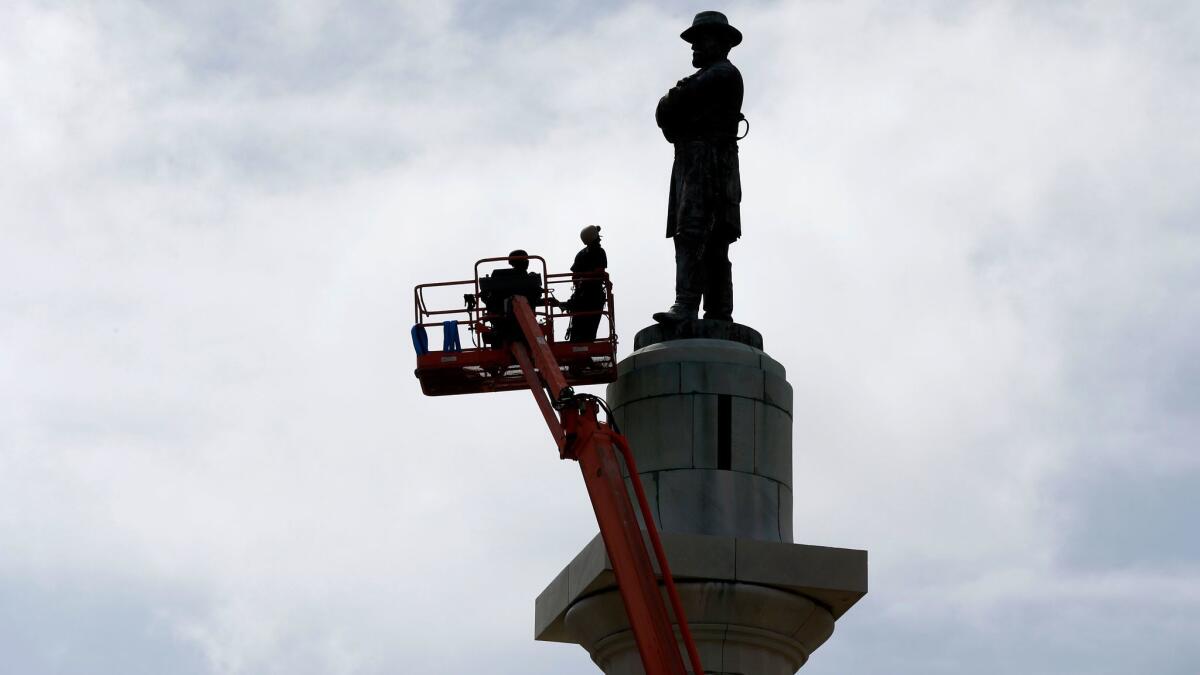Newsletter: Trump’s contemptible Confederate comparisons

- Share via
Good morning. I’m Paul Thornton, and it is Saturday, Aug. 19, 2017. Just to jog your memory a bit about how long ago and historically dissimilar last week seemed, here’s the newsletter from exactly one Saturday ago, way back when the big story was a possible nuclear confrontation with North Korea. With that in mind, let’s take a look back at the week in Opinion.
This week,
Equally but perhaps less obviously problematic was Trump’s remarks putting Confederate generals like Robert E. Lee Stonewall Jackson alongside Founding Fathers Thomas Jefferson and George Washington because Jefferson and Washington owned slaves. To some, Trump’s logic might be appealing, as numerous monuments to the first and third presidents exist without controversy throughout the nation, while memorials to Jackson and Lee are being removed or protested. Editorial writer Scott Martelle points out the serious deficiencies in Trump’s reasoning:
The issue isn’t whether Washington and Jefferson owned slaves. They did, and problematically so. But that’s not why the nation holds them in esteem. They are commemorated because of their role in founding the nation.
Compare that with Robert E. Lee, who quit the U.S. Army to join the Confederates. What is the term we’d use in the present for a military leader who quits and joins an army that is attacking the U.S.? Jefferson Davis was a feckless figure who served in the U.S. Senate with little impact before he became president of the Confederate States of America — a country that existed only in the minds of its creators (no other nation recognized its legitimacy). Nathan Bedford Forrest, who was a slave trader before the war, was a crucial figure to the rise of the Ku Klux Klan after the war ended.
These men, and others like them, sought to tear asunder the United States to preserve an economic and social system premised upon a belief in white supremacy and built on the enslavement of another race.
To venerate such men is to honor those responsible for the nation’s worst tragedy — the Civil War — and who were the violent defenders of our worst institution, slavery. Despite Trump’s parroting of the talking points, removing memorials to heroes of the Confederacy does not change history, it corrects testimonials to it....
There is no moral prism through which one can view with pride the generals and soldiers who went to war to keep others in chains. That the president of the United States doesn’t understand that might not be surprising, but it is still contemptible.
Trump’s disastrous statements on Charlottesville: He spoke about the protests in Virginia on three separate occasions these last several days, and each time this words were either transparently insincere or dangerously inadequate. Reacting to Trump’s initial response on Saturday, The Times Editorial Board called the president’s statement a “milquetoast condemnation that failed to call out the racism that propelled Friday’s march and Saturday’s violence.” Later, after Trump issued an explicit, if rote, condemnation of white supremacy and, one day later, startled every decent person in this country by saying there were surely some “fine people” marching alongside the neo-Nazis, the board observed that the president does not seem to understand that “racial hatred and intolerance among some of his followers is the enduring problem here.”
Yes, neo-Nazis and white supremacists have the right to protest — but no one has the right to start throwing punches or inciting violence, including any counter-demonstrators who show up the oppose them, notes The Times Editorial Board. This is worth pointing out, says the board, because calls across the country to revoke permits for demonstrations like the one in Charlottesville have grown louder. “Instead,” says the board, “local officials must rise to the challenge and ensure the public peace through proper preparation, crowd control, site-specific rules on what items are allowed, and other reasonable steps to mitigate violence.” L.A. Times
Is the liberal brain capable of fighting the hate seen in Charlottesville? Neuroscientist Robert M. Sapolsky notes that the human brain can make the difference between, say, 1 and 1.000001 seem just as drastic as the difference between 1 and 100. Similarly, over the last few years, liberals have increasingly drawn distinctions between themselves — “and then along comes Charlottesville, and we are reminded about just how contrasting contrasts really can be.” L.A. Times
Even Trump can say “racism is evil.” Much harder is not to act racist. Case in point, notes Ann Friedman: The day before Trump made that statement, he suggested he may pardon the criminally convicted ex-sheriff
Bannon’s out — hooray! (But remember, Trump’s still president.) Scott Martelle isn’t too hopeful that the exit of presidential Svengali Steve Bannon will produce a less erratic Trump, as hard-right figures like Steve Miller and Sebastian Gorka remain near the Oval Office. “Regardless,” says Martelle, “Bannon’s exit means one less extremist in the White House, and whether that will help rein in the worst impulses of Trump … should become clear fairly soon.” L.A. Times
Reach me: paul.thornton@latimes.com
Sign up for Essential California
The most important California stories and recommendations in your inbox every morning.
You may occasionally receive promotional content from the Los Angeles Times.








